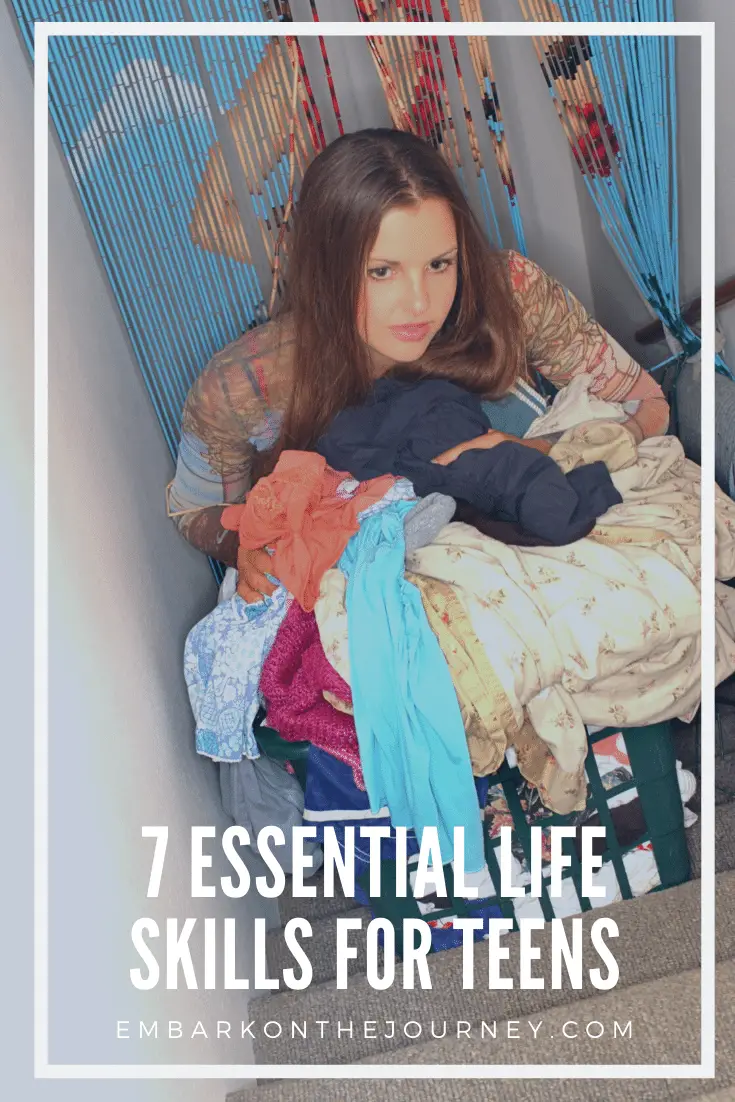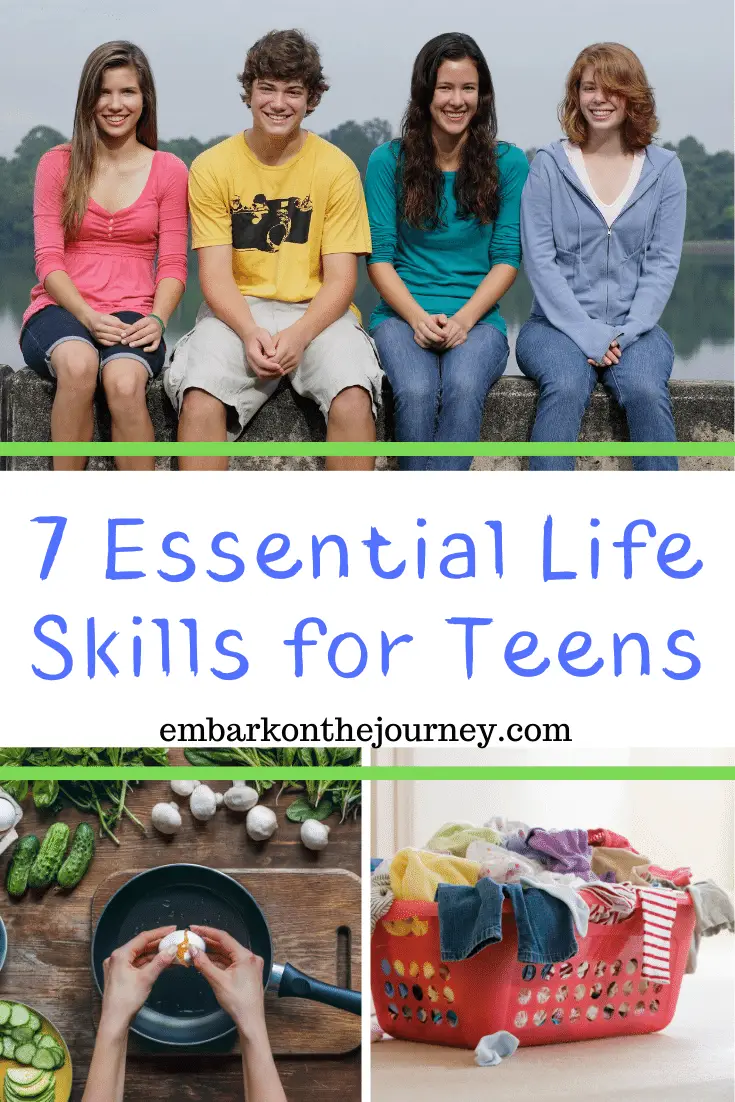What are you doing today to prepare your teen for adulthood? I’m not talking about academics. I’m talking about real life skills for teens that they’ll need to survive outside your home.
Looking back, I realize that I was not prepared to leave the nest. I could do laundry, and I could cook a few casseroles. But, I wasn’t really prepared for all that it takes to be an adult. I couldn’t make a budget. I didn’t know what a meal plan was.

I know that much of adulthood is learned from everyday experience, but I also know that there was so much my mom could have taught me that she didn’t.
So, I am striving to make sure that my daughter is prepared to manage her own home when she leaves my house.
Life Skills for Teens
Life is full of unexpected surprises, and I want to help her be prepared as much as I can.
Financial Literacy
This is a biggie, and it’s one of the most important things you can teach your teen. Teens need to know how to make a budget and stick to it. Start them out with a written budget so they can track their income and expenses. Seeing where the money goes each month makes a budget easier to stick to.
They need to be able to know how much they’re allowed to spend and know how to balance treating themselves with being responsible with their money.
Let your teen open a student checking account as soon as they are earning enough money to warrant one. Student accounts tend to have different limits and penalties than a regular account – almost like an account with training wheels. When they open a bank account, allow them to begin using a debit card so they are in control of their own spending.
Help them determine which percentage of their money will go to savings and to spending. Will they tithe or donate to charity? Tracking where their money goes, helps teens learn to set a realistic budget. One they can stick to.
[mv_video key=”ehid5ufzikmntozlf482″ volume=”70″ aspectRatio=”true” title=”Earning High School Credits in Middle School” thumbnail=”https://mediavine-res.cloudinary.com/video/upload/ehid5ufzikmntozlf482.jpg” doNotOptimizePlacement=”undefined” doNotAutoplayNorOptimizePlacement=”false” sticky=”false”]
Taking Care of Her Body
Teen bodies are changing in big ways. In fact, my daughter, 13, grew 2.5 inches in six months! As a result, she has needed more sleep recently. She’s going to bed earlier, and she’s sleeping later each morning. I’ve learned to tailor our homeschool day to accommodate her need for increased sleep.
In addition to sleep, though, she’s learning to eat healthier and trying to drink more water. She’s learning the benefits of regular exercise, as well. With her recent diagnosis of Ehlers-Danlos Syndrome, all of these have taken on a whole new meaning. When she doesn’t make wise choices – no water, poor diet, no exercise – her joint pain is much worse.
All teens need to learn to take good care of their bodies, however, regardless of whether they have a chronic illness or not.
Housekeeping
Learning to keep their belongings tidy and neat is an important life skill for teens. Not only does it involve knowing how to wash the dishes, do laundry, and clean a bathroom, but it includes knowing how to organize a space to accommodate the items in it. More than that, though, it’s about know how to do all of the above well. A job that isn’t done right isn’t done.
From a young age, my children have chores and responsibilities. They have to mop, vacuum, scrub, and pick up around the house. We’ve had elaborate chore systems, and we’ve had simple ones over the years. I’ve purchased chore charts, typed them on the computer, and even written them on color-coded index cards.
The easiest way to track jobs in our house is to use a chore chart that can be printed. Printable chore charts can be laminated and wiped clean each week. This especially helpful if your kids rotate chores.
Meal Planning
Meal planning may be one of my least favorite chores each week. However, if I don’t plan, we’re more likely to run through a drive-through or eat lots of ham and cheese for the week. This is a task, however, that my daughter can learn to take over. She can go through my recipes and cookbooks and create a working menu for the week.
At thirteen, she’s fully capable of printing a weekly menu plan and writing it all out. She can also use that menu plan to write out our master grocery list before we head to the store. This will give her the practice she needs to be able to do this for herself and/or her own family one day.
Basic Cooking Skills
Not only do teens need to know how to plan a meal, they need to know how to cook it. Emma loves to be in the kitchen. She loves to bake – cookies, scones, pancakes, etc.
However, she doesn’t yet know how to make dinner for the family. She can pop a pizza in the oven or make Ramen noodles, but that’s not enough. So, we are beginning to work on basic cooking skills like browning meat and cooking fresh vegetables.
We’ll progress to making full meals together, and then she’ll be in charge of dinner once a week. My goal is for her to have a full recipe book of meals that she can cook on her own when she leaves the nest one day.
Time Management
Time management is becoming a huge topic of conversation in my house. Em has been bitten by the planning bug! She loves to grab my planner each weekend and plan out her own week in her own planner. I love that she is taking control of her schedule.
She’s in charge of making sure her homework is done for co-op. Nutcracker rehearsals and youth group are blocked out on her planner so she can see when she has free time each week.
Knowing what non-negotiables are on her schedule, she can plan sleepovers and time for crafting or catching up on her favorite shows.

Life After High School
No matter what the plan is – college, trade school, full-time work, or being a homemaker – the important thing is to have a plan. It’s important for teens to have a goal they’re working toward.
Explore career options to feel out different paths. Allow teens to volunteer in places that line up with things they’re interested in doing after high school – animal shelters, dentist office, political campaign, day cares.
Getting a first-hand look at different options will help teens narrow down their ideas for the future and will help them determine whether college is necessary or not.
What are you doing today to prepare your teen for adulthood?
Related Posts
 |
 |
 |